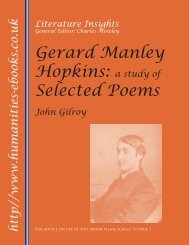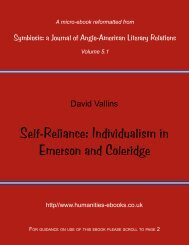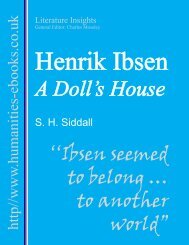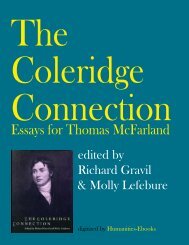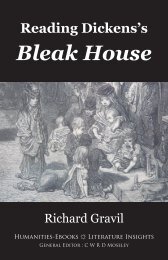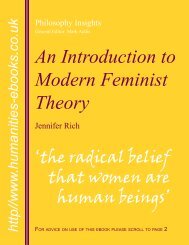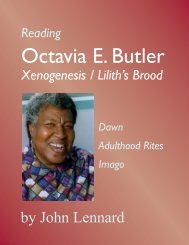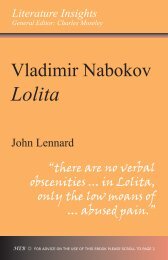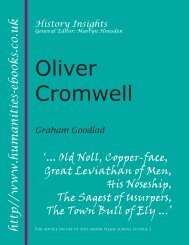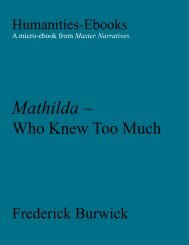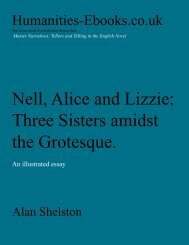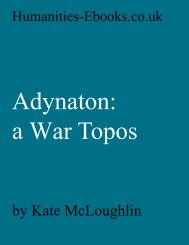Poisoned Pens: The Anglo-American Relationship and the Paper War
Poisoned Pens: The Anglo-American Relationship and the Paper War
Poisoned Pens: The Anglo-American Relationship and the Paper War
You also want an ePaper? Increase the reach of your titles
YUMPU automatically turns print PDFs into web optimized ePapers that Google loves.
Running Head <br />
A micro-ebook reformatted from<br />
Symbiosis: a Journal of <strong>Anglo</strong>-<strong>American</strong> Literary Relations<br />
Volume 6.1<br />
Jennifer Clark<br />
<strong>Poisoned</strong> <strong>Pens</strong>: <strong>The</strong> <strong>Anglo</strong>-<br />
<strong>American</strong> <strong>Relationship</strong> <strong>and</strong><br />
<strong>the</strong> <strong>Paper</strong> <strong>War</strong><br />
http//www.humanities-ebooks.co.uk<br />
For guidance on use of this ebook please scroll to page 2
Publication Data<br />
© Symbiosis 2002, 2007 all rights reserved<br />
<strong>The</strong> Author has asserted her right to be identified as <strong>the</strong> author of this Work<br />
in accordance with <strong>the</strong> Copyright, Designs <strong>and</strong> Patents Act 1988.<br />
First published in SYMBIOSIS, 6.1, April 2002, pp. 45–68<br />
2nd electronic edition published in 2007 by Humanities-Ebooks LLP<br />
http://www.humanities-ebooks.co.uk<br />
Tirril Hall, Tirril, Penrith CA10 2JE<br />
Essays published in Symbiosis are subsequently digitized<br />
for <strong>the</strong> benefit of <strong>the</strong> author (80%) <strong>and</strong> <strong>the</strong> Journal (20%)<br />
Reading Options<br />
To use <strong>the</strong> toolbar this Ebook should be read in default view.<br />
To navigate use <strong>the</strong> hyperlinked ‘Bookmarks’ or thumbnails at <strong>the</strong> left of <strong>the</strong> screen.<br />
To search, click on <strong>the</strong> binocular symbol in <strong>the</strong> toolbar.<br />
Use to enlarge <strong>the</strong> page to full screen.<br />
Licence <strong>and</strong> Permissions<br />
This ebook is licensed for reading on a particular computer.<br />
<strong>The</strong> original purchaser may license <strong>the</strong> same work for a second computer<br />
by applying to support@humanities-ebooks.co.uk with proof of purchase.<br />
It is permissible to print a watermarked copy of <strong>the</strong> book for your own use.<br />
ISSN: 1362-7902<br />
A cumulative index of Symbiosis essays <strong>and</strong> reviews is online at<br />
http://www.symbiosisonline.org.uk
Jennifer Clark<br />
<strong>Poisoned</strong> <strong>Pens</strong>: <strong>The</strong> <strong>Anglo</strong>-<strong>American</strong> <strong>Relationship</strong> <strong>and</strong><br />
<strong>the</strong> <strong>Paper</strong> <strong>War</strong><br />
“<strong>The</strong> English pencil has saddened <strong>the</strong> portrait of America”<br />
North <strong>American</strong> Review, July 1821.<br />
“Cromwell said that a Government was weak that could not st<strong>and</strong> paper<br />
shot. Who <strong>the</strong>n shall write down a nation?”<br />
Richard Rush, Memor<strong>and</strong>a of a Residence at <strong>the</strong> Court of London, 1818.<br />
“That nation hates us,” wrote Thomas Jefferson in 1786 after visiting Engl<strong>and</strong>,<br />
<strong>and</strong> if this was not damning enough, he added, “<strong>the</strong>ir ministers hate us, <strong>and</strong><br />
<strong>the</strong>ir king more than all o<strong>the</strong>r men.” 1 Jefferson’s observation was not an isolated<br />
one. After <strong>the</strong> Revolution <strong>American</strong>s were repeatedly shocked <strong>and</strong> dismayed<br />
that <strong>the</strong> English could not harbour a more generous attitude towards <strong>the</strong> new<br />
United States. <strong>The</strong>y believed English travellers in America wrote insensitive<br />
<strong>and</strong> myopic records for an ignorant market; <strong>the</strong> British government endorsed<br />
those views <strong>and</strong> resented or ignored <strong>the</strong> progress <strong>and</strong> refinement of <strong>American</strong><br />
nationhood, <strong>and</strong> <strong>the</strong> powerful British periodicals fuelled a campaign against a<br />
young <strong>American</strong> culture. This apparent antagonism wounded <strong>American</strong>s who<br />
were in <strong>the</strong> process of adjusting to <strong>the</strong>ir new nationality <strong>and</strong> for whom a fading<br />
Englishness flavoured an idealised perception of <strong>the</strong> <strong>Anglo</strong>-<strong>American</strong><br />
relationship. Some were prepared to hit back, figuratively at least, in what<br />
became known as <strong>the</strong> <strong>Paper</strong> <strong>War</strong>.<br />
1. Thomas Jefferson to John Page, May 4, 1786. <strong>The</strong> <strong>Paper</strong>s of Thomas Jefferson, Vol.<br />
9, ed. Julian P. Boyd (Princeton: Princeton University Press, 1954), 446.



